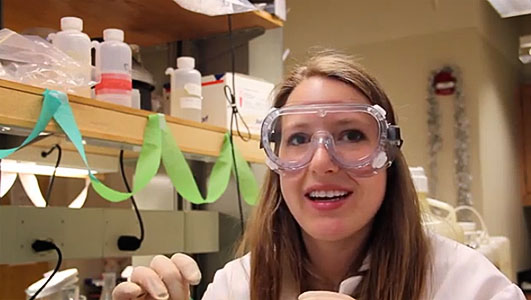Bio student creates a 'Capitol' research poster
04-25-2014
Writer(s): Tim Brouk

Miss Reinhart is going to Washington. Watch the YouTube video from the College of Science.
Thanks to a stellar undergraduate research experience in Biological Sciences Prof. Dennis Minchella's Lilly Hall lab, Katie Reinhart will be participating in the Posters on the Hill event April 28 and 29 in Washington, D.C.
She will join other undergraduate students from across the nation for a couple days of networking and discussing research. Reinhart's poster will be one of about 60 from almost 600 applications.
A parasite known a schistosome granted Reinhart this Capitol opportunity. Schistosomiasis is a chronic disease of humans and is usually found in tropical countries. The disease is spread through fresh water and it is spread by parasite carrying snails. Reinhart's work examines how the genetic diversity of parasite infections affects disease intensity in these snails.
"We combine different strains to test the effect of genetic diversity," said Reinhart of her year-plus of research. "In our results as far as post-reproduction and parasite reproduction, we found a little bit of evidence supporting that more genetically diverse populations gives more virulent infections, which is important because that would make a difference to how they would manage the disease."
The work that started during her freshman year also yielded some surprising results in the parasite's reproduction cycle.
"It appeared to peak every four weeks which no one ever found," Reinhart explained. "We followed up on it longer. It took us 22 weeks to identify this pattern."
In the lab, Reinhart collects data from 550 snails manually with calipers to measure growth and dissecting microscopes to count how many parasites were coming out.
"We have a bunch of the parasites in the freezer that we extract the DNA from to figure out the proportion of the different strains in the infection," the Danville, Ind., native said.
Professor Minchella noted "This is a wonderful opportunity for Katie and her graduate student mentor Alyssa Gleichsner to interact with both scientists and politicians and to learn about science policy. Their work illustrates the value of early undergraduate research experiences and they will serve as outstanding ambassadors for science and Purdue."
Reinhart credits her knack for research on the early and unexpected opportunities given to her during her freshman year.
"I've gotten so much support from the people in the College of Science encouraging me every step of the way because this stuff is so hard. You can't develop these sorts of skills by yourself," Reinhart said. "The opportunity to work with cutting edge DNA technology, it was hard to understand coming in as a freshman but I've had the opportunity to work with DNA polymerases and qPCR (quantitative polymerase chain reaction). This new method of strain detection was only developed a year or two ago, and it is something special to our lab that we are proud of."
Click here to view Reinhart's impressive research poster.